A-I-U-E-O Gabun -weave the memories of community-
http://gabun.jp
” A-I-U-E-O Gabun” (“Gabun”, litteraly “pictures and sentences,” hereafter called ‘gabun’) is a photo and wordplay activity inspired by the tradition of Japanese word game forms. It is moreover a simple storytelling project consisting of photographs and sentences aimed to encouraging sustainable local communication and community building.
Gabun has been continuously implemented though 2007 till 2012. First, gabun was developed as workshop primarily in 3 different locations across Japan; Shonan in Kanagawa prefecture, Toyohashi city in Aichi prefecture and Bunkyo-ward in Tokyo. 2011, gabun further expanded its breadth by working in collaboration with Tokyo Cable Network Inc., and Bunkyo-ward office.
The current 2011 project will continue until March 2012. Here multiple varieties of media are being designed to converge with one another, such as a regular CATV program, website, flyer, and workshops. With the help of various media, we aim to bring people together, allowing for them to talk and share their personal memories of the photos, secondly, create collaborative gabun stories, using their photos, and lastly, display these stories and photos and invite comment from all participating parties. Concurrently we’re trying to expand and repeat this process with cooperation of multiple media to weave the memories of community over as many platforms as possible. (Kiyoko Toriumi)
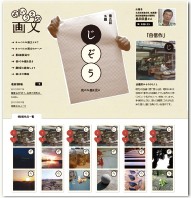
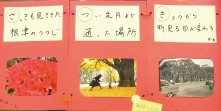

Gakkan Engawa Workshop
http://engawa.ai.rcast.u-tokyo.ac.jp/
“Gakkan Engawa Workshop” is a media expression workshop utilizing citizen participation. The workshop was designed and held to celebrate the opening of Fukutake Hall at Hongo campus of the University of Tokyo in March 2008.
With the completion of Fukutake Hall, we aspired to make it an open and connected space, much like the corridor balconies of Japanese traditional houses called ‘Engawa’ and thus we decided to name our workshop “Gakkan Engawa.” We invited participants to find a picture or photo image expressing ‘wa’ (‘circle’ in Japanese) followed by sending it to us with a short caption using either mobile phone or PC. We processed these in real time and projected them onto large windows of Fukutake Hall.
We set multiple visualizing modes to present images as:
1. Descending cascade-type visualization: thumbnail images descending in a chronological sequence (Picture1)
2. Firework-type visualization: thumbnail images with the same keyword gather and made a popping-up motion much like a firework (Picture2).
3. Additional screen display: showing individual images in their original size with captions.
We collected 361 images and messages, where the variety of interpretation of “wa” was found from a cute ripple of raindrop to a human circle of a group dance. The workshop proved to be a great success, with many students, faculty members, alumni and even people from the local community participating in this creative activity. (Kim Yonnie)
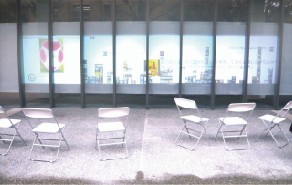 Picture1
Picture1
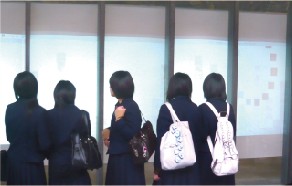 Picture2
Picture2
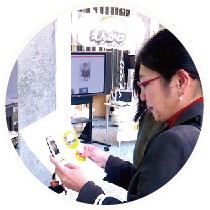
Media Conte
http://mediaconte.net/
Media Conte is a digital storytelling project, focusing on the people who are marginalized and tell their untold stories. With the storytelling movement found in the West, it is often said that “everyone has a story to tell,” and so in workshops conducted on the theme, participants appear to feel like they are expected to prepare stories in advance, just to fulfill this credo. However, in the case of Japan, many people don’t seem conscious of their own opinion or aware of the stories of their own life.
In order to harvest the seeds of these untold stories, first, we focused on the role of university students as facilitators, editors, and/or co-creators. They are expected to cooperate with the participants by listening to their unvoiced voices, helping to generate stories and video production.
We then designed workshops that utilize a kind of card. Here, children and senior citizens play with the students within their own pre-story space using various cards, allowing them to identify the seeds of their stories. From these seeds, stories are formed, transformed, and refined. We have so far engaged in seven Media Conte. University students as facilitators have collaborated with, for example, children of foreign working people, international students, aged neighbors, and handicapped persons. (Akiko Ogawa)
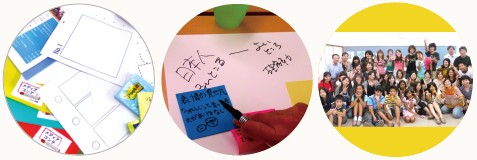

Keitai Trail!
“Keitai Trail!” is a collaborative media practice, designed to collect, connect and visualize people’s stories through a game-like activity. We used “keitai (mobile phone in Japanese)” as a main activity tool, not only in order to invite people in their most familiar setting, but also to explore a new way of using mobile phones for media expression. We developed rules for their activity (figure1).
Storytelling activities were recorded with the mobile movie kit. Finnally, we created a connected network of people’s stories and visualized them in a collaborative expression map.
●Keitai Trail! in Media Literacy Workshop
http://mahorama.ai.rcast.u-tokyo.ac.jp
http://wbs-next.ai.rcast.u-tokyo.ac.jp
As a collaborative program with Namkai broadcasting station in Ehime prefecture, we utilized the “keitai trail!” format in a media literacy workshop with teenagers in 2008. For more information of the program, please check the above website.
●Keitai Trail! in Ars Electronica
http://keitaitrail.ai.rcast.u-tokyo.ac.jp
We held a “keitai trail!” workshop in ARS Electronica in 2008 to collect and connect more than 250 stories on people’s “mobiles”. Please visit the above website to view whole stories and movie clips. (Kim Yonnie)

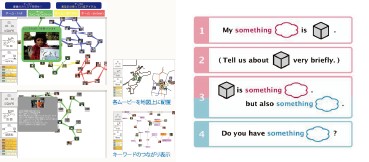
Radio Community Quest!
Radique! (Radio Community Quest) is a ‘quest workshop’, where participants explore local towns with map and IC recorder in hand, recording their experiences, cutting and editing and finally sharing these local stories on community radio stations. Radique! workshops were held so far in local shopping districts of Kyoto and Kobe, joined by students from Yuko Tsuchiya lab at Hiroshima University of Economics and Akiko Ogawa lab at Aichi Shukutoku Univeristy.
On August 9th-10th, 2010, the first workshop took place around Sanjyo-dori in Chukyo-ku, Kyoto city, with around 30 students participating. Students were asked to interview local shop owners about their “life philosophies”. These recordings were later edited out of which 30 minute long programs were made and broadcast on Kyoto Sanjyo Radio Café.
The second workshop was held on August 11th-12th of 2011 with the cooperation of a community radio station FMYY, pulling a crowd of 27 students. The workshop’s theme was here “Memories of Disasters, Relay of Memories.” It was held at a shopping area, located in the Shinnagata south district of Kobe city, the site of the 1995 Great Hanshin Earthquake. Students asked members of the public what one needs to know about disaster prevention. From the recorded material, the students crafted a 30 minute radio program, entitled “Nagata’s messages from the heart – experiences of disaster and reconstruction.” (Yuko Tsuchiya)


Toyama Photo Senryu
http://tut-mlp.ai.rcast.u-tokyo.ac.jp/
“Toyama Photo Senryu” is a media literacy project conducted in collaboration with Tulip Television, a commercial broadcasting station in Toyama prefecture. It was moreover a cross media activity using the TV program and an official website for both PC and mobile phone. Alongside this, several workshops were held in Toyama prefecture and Tokyo.
In this project, we collected “photo senryu” (“Senryu” is a satirical poem consisting of 17 Japanese syllables) on the theme of “Images Toyama television never shows you”. By making the “photo senryu”, participants discovered the discrepancy between the image of Toyama broadcast by mainstream media and their own actual reality of everyday life. “Toyama Photo Senryu” allowed participants to create their own image of Toyama.
Through the website and workshops, more than 300 “Toyama Photo Senryu” were collected, of which 46 were made into “Toyama Photo Senryu Karuta” (Karuta is a traditional Japanese playing cards with pictures and words). Finally, we organized a “Toyama Photo Senryu Karuta” competition as a closing festival of the project, held at one of the largest shopping malls in Toyama prefecture. Now, the project is a planning to move on to the next stage by working on a collaboration with a local news paper. (Kiyoko Toriumi)
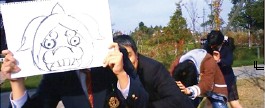
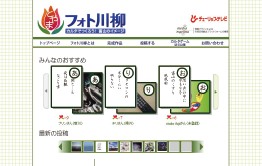
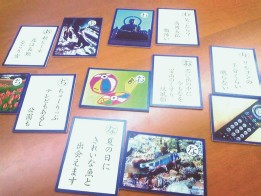
-
Recent Entries
-
Categories
-
Archives